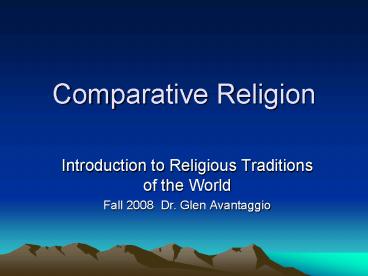Comparative Religion PowerPoint PPT Presentation
1 / 23
Title: Comparative Religion
1
Comparative Religion
- Introduction to Religious Traditions of the World
- Fall 2008 Dr. Glen Avantaggio
2
What is religion?
- Three different questions
- Etymology What does the word mean?
- Content What are the aspects of religion?
- Explanation Why are there religions?
3
What does religion mean?
- One etymology religare (L.) to tie back, to tie
again. - Connecting to greater, unseen reality
4
What is the content of religion ?
- What is religion made of?
- Religions complex and varied
- Elements
- Founders and Leaders
- Beliefs and Practices
- Rituals
- Symbols and myths
- Sacred story and texts
- Cultural characteristics
5
Ways of Being Religious
- Religion is diverse in many ways
- between religions
- within religions
- by culture
- by individual
6
Why Does Religion Exist?
- Ludwig Feuerbach (1804-1872)
- Philosopher
- Projection of human qualities
- Power, wisdom, love projected onto imagined deity
- God becomes greater, humans become less
7
Why Does Religion Exist?
- Sigmund Freud (1856 -1938)
- Psychoanalyst
- Religion is mental illness
- God like parent we fear and love
- An illusion arising from insecurity
- universal obsessional neurosis
8
Why Does Religion Exist?
- Karl Marx ( 1818-1883)
- Historian
- Religion serves those in power
- instrument of oppression
- illusory happiness
- the opiate of the people
9
Why Does Religion Exist?
- Carl Jung (1875 -1961)
- Psychologist
- Expression of the potential in people
- Archetypes of the Collective Unconscious
- Paths of individuation
10
Why Does Religion Exist?
- Emile Durkheim ( 1858 -1917)
- Sociologist
- Creates social harmony
- Teaches love, compassion, justice
- Evokes altruistic behavior
- Social glue
11
Where do religious ideas come from?
- Oral Tradition
- Revered Texts
- Reason
- Personal Experience
- Mystical experience and traditions
12
What is mysticism?
- Rudolph Otto (1869 -1937)
- Spontaneous experience of being grasped by
reality - An experience of the numinous which is
ineffable, i.e. indescribable - Contradictory feelings of awe, and attraction
- The essential basis of religion
13
What is mysticism?
- Joachim Wach (1898 -1955)
- 1. Experience of unseen reality
- 2. Involves persons whole being
- 3. Shattering and intense experience
- 4. Motivates a person to action
14
Patterns in Religious Experience
- Sacred and Profane
- Pattern explored by Mircea Eliade (1907 -1986)
- Sacred Realm extraordinary, highest values,
source of world - Profane Realm worldly, everyday experience
- Immanent and Transcendent
- Immanent divine present in world
- Transcendent divine beyond world
15
Ways of being religious
- Theism
- Sacred reality as a personal being, God.
- God as friend, parent, ruler, lover
- Belief in incarnation
- Monotheism
- Polytheism
- Nontheism
16
Ways of being not religious
- Atheism God does not exist
- Agnosticism Gods existence in uncertain
- Uninterested
17
Absolutist and Liberal Interpretations
- Orthodox - strictly adhere to past practice and
belief - correct view
- Define themselves in resistance to change
- Heterodox
- other view
- Heretics are labeled by the orthodox
- Heretics are often punished
18
Absolutist and Liberal Interpretations
- Religious Liberals
- Accept some change
- Understand religions as cultural and historical
- Fundamentalism
- A movement within Protestant Christianity
- Also, a general term for strong adherence to
tradition - Some fundamentalists are willing to use violence
19
Interpretation of tradition
- Fundamentalism
- Forms of religious nationalism
- Rejections of secular values
- Defensive reaction to modernity
- Textual literalism
20
Historical-Critical Study of Scriptures
- Develops from Hermeneutics
- Interpretation necessary
- What is the best interpretation?
21
Historical-Critical Study of Scriptures
- Basic Questions
- Most original text?
- History of text ?
- Authors?
- Intentions of authors?
22
Historical-Critical Study of Scriptures
- Historical Aspects
- Archeology?
- Cultural setting?
- Oral and written sources?
- Political environment?
23
Historical-Critical Study of Scriptures
- Other areas of research
- Intended audience?
- Contemporary language usage?
- Literary form?
- Universal, archetypal message?

